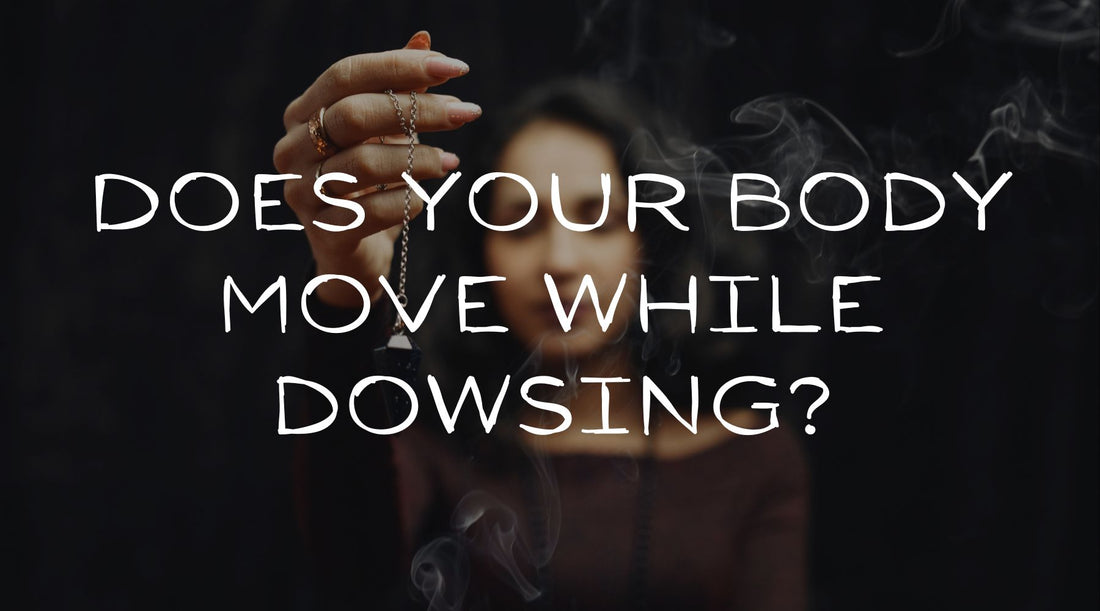
Does your body move while using a dowsing pendulum?
Share
Imagine using your pendulum in front of other people, focusing on your questions, and hearing someone saying "But you moved!". For some practitioners, these words might be triggering: Should I stay perfectly still? Is that person implying I am cheating? So let's clear the air and answer this question:
does, yes or no, your body move while you are dowsing?
YES, of course, it does!!! That's for the quick answer, now let's dive in detail.
Your pendulum would have only 3 ways to move:
- by itself, but seeing inanimate objects moving by themselves is a rather rare occurrence,
- by an external force, like telekinesis,
- by amplifying the micro-movements of your own body.
While testimonials or descriptions of people doing telekinesis are extremely rare, practitioners able to get accurate answers using their pendulums are so numerous we couldn't even estimate their number.
Using a pendulum doesn't require any external force, and to understand why, we can see it as a tool to amplify messages you get through your body.
Your intuition, or higher self, is able to get answers to things you don't know consciously. If you were to decipher this informations using your brain, you might have a hard time doing that, as what you know from the context, and your own biases might make you doubt and block the message. With dowsing, you are allowing your body to receive the message, and letting the pendulum tell you what it is in a simple and effective way.
Your higher self gives you the message, and your body responds to it with micro-movements, so subtle you aren't even aware of them most of the time, and they make the pendulum move.
Depending on practitioners, these subtle movements can be so delicate that we wouldn't notice them watching the person dowsing. Some other practitioners work differently and you can see that they are not static.
In the end, none of this matters, only the result does: Does the way the person practices dowsing allow them to get the answers they are looking for?
Because dowsing relies on these subtle movements, it's important to let them flow as much as possible, practicing in a comfortable position.
Most of the time, sitting straight, letting the elbow free, is a great position to get the best results. If it doesn't work for you, try practicing standing up. Some pendulum users even keep their elbow on a table, and despite it working only with the subtle moves of their upper arm and hand, get wonderful results. Some people have a hard time getting this pendulum to move at the start and would give it a little impulsion to begin with, and once the pendulum has found its motion, it gives them the messages. As long as it works for you, it's all good.
FAQ
But someone told me I'm not doing it the right way, that I should do things differently...
People telling you what to do are free to follow their OWN way for their OWN practice. The way you feel comfortable dowsing is your own business. And how do we know which positions work best? We do because throughout history, practitioners have tried different things and shared with others what was the most effective for them: the way of practicing dowsing is multi-faceted, and you are most than welcome to add your own twist, innovate, and experience.
I can't find a position that feels comfortable, it feels like I'm doing it all wrong...
By experimenting, you will for sure find the right position for you. If this part gives you a hard time, you might be other thinking. There isn't really a good or a bad way to do it, only the one that works for you.
If the answers are expressed by the micro-movements of my body, do I actually need a dowsing pendulum?
Well, I probably shouldn't tell you that as I make a living crafting and selling you divination tools, but... you could actually do the same thing without a pendulum, by relaxing and literally using your body. But let's be honest: this would be harder, and time-consuming, so blessed be pendulums! But trying dowsing without a pendulum is a fun experience and you could give it a try: this exercise might reinforce your connection to your body and get a deeper understanding of how it works.
Despite knowing that my body does move while dowsing and that there is nothing wrong with that, I feel bad when someone notices and reproaches me that, why is that?
Being confident in our practice is hard: we have to deal with our fear of making up the answers, of not being able to get the right messages, and if we share about divination, we add the fear of people not taking us seriously or not believing us. As long as we don't feel perfectly comfortable with what we do and why we are doing it, any comment might highlight the imposter syndrome we might have.
If you feel this way, there are many solutions from practicing until you feel confident to sharing with people you trust or friends having the same interest. Confidence comes from having gotten results from your dowsing practice, and you are the one defining what is a satisfactory result for you. This could be having a better understanding of how your intuition works, being more comfortable in your body, to making accurate predictions each day: you are the one deciding.
Many people will ask genuine questions out of curiosity, which is of course completely fine.And there will always be people prone to criticize and make remarks about your practice, any comment section on social media can show us that. They might act this way out of jealousy, lack of self-confidence, or tons of other reasons. We can't control that, can we? But we can choose to share as much as we are comfortable with, from secrecy to sharing openly while not caring about what they think.
I hope this focus on dowsing helped you in your practice. If you have more questions, or tips to help other practitioners, please do in the comments!


